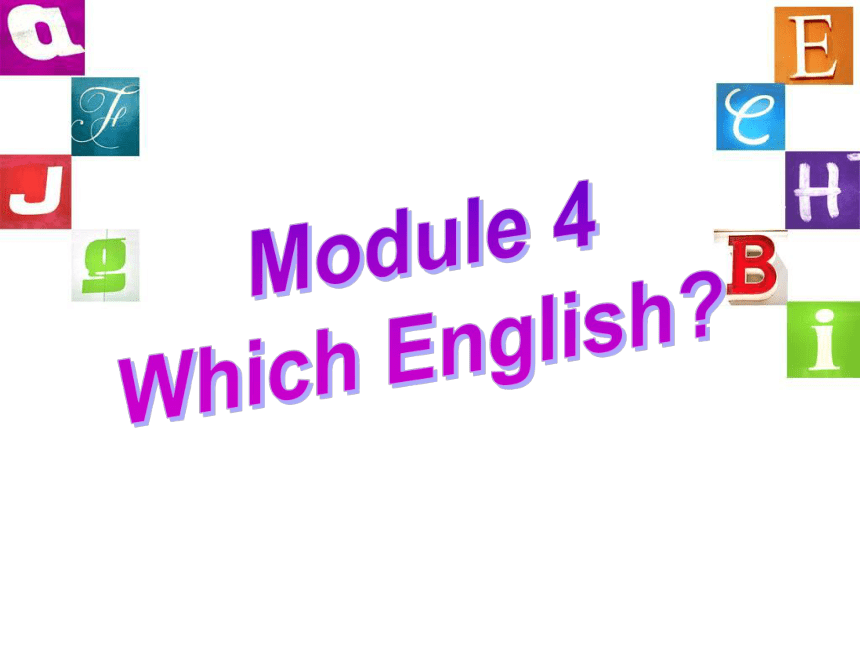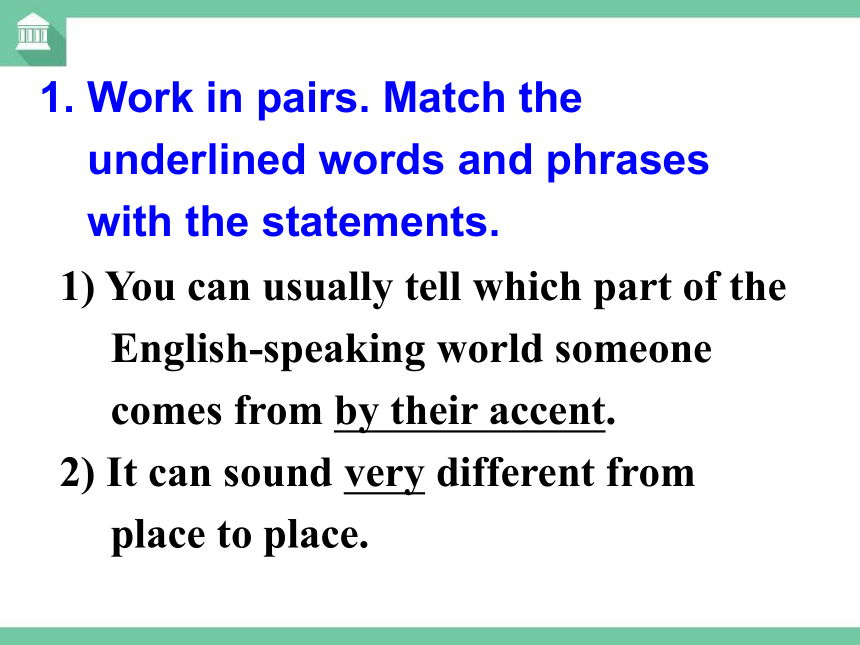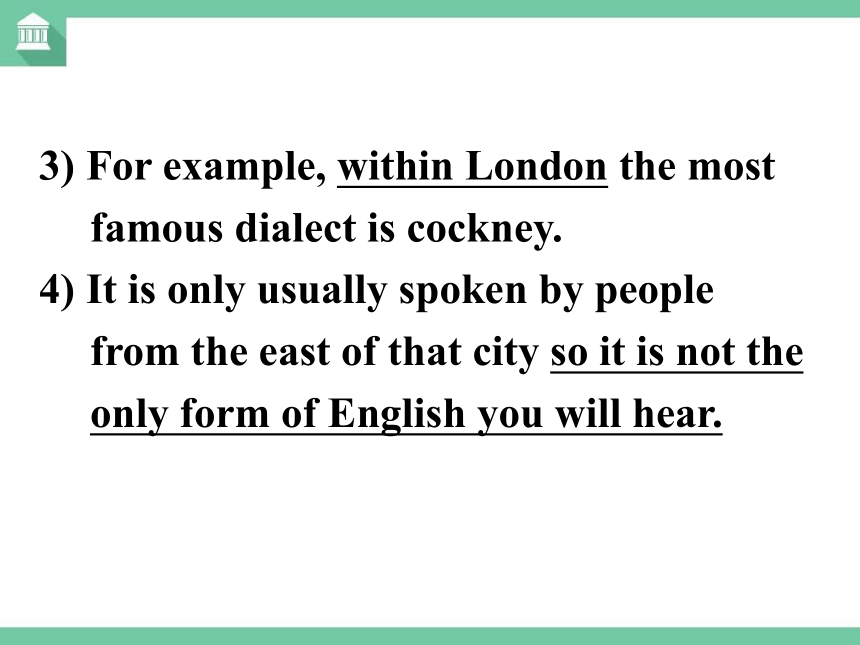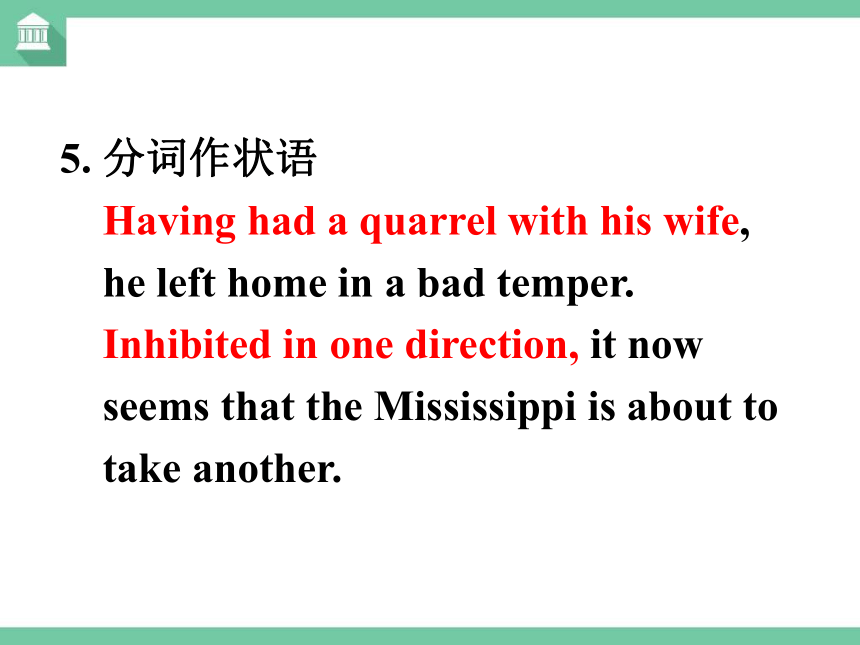外研版选修八Module 4 Which English - Grammar课件(61张)
文档属性
| 名称 | 外研版选修八Module 4 Which English - Grammar课件(61张) |  | |
| 格式 | zip | ||
| 文件大小 | 977.4KB | ||
| 资源类型 | 教案 | ||
| 版本资源 | 外研版 | ||
| 科目 | 英语 | ||
| 更新时间 | 2019-07-21 22:38:15 | ||
图片预览












文档简介
课件61张PPT。Module 4
Which English?Review of adverbials and adverbial clauses Grammar
状语是用来修饰_____、_______ 、____或________________:一般表示时间、地点、 方式、 程度、 条件、 目的、结果、让步、伴随情况等意义。
1. 状语的位置
英语中的状语在句中的位置比较灵活:动词形容词副词整个句子的成分状语修饰形容词的状语, 通常放在所修饰的词_____;修饰动词的状语, 一般放在所修饰的动词_____。
但有些副词如always, often, usually, never, ever等作状语时,则放在________之前, _______、________或_________之后。之前之后实意动词助动词be动词情态动词Grammar (1)
Review of adverbials1. Work in pairs. Match the
underlined words and phrases
with the statements.1) You can usually tell which part of the English-speaking world someone comes from by their accent.
2) It can sound very different from place to place.3) For example, within London the most famous dialect is cockney.
4) It is only usually spoken by people from the east of that city so it is not the only form of English you will hear.5) English spread across the world over hundreds of years because of trade, exploration and business.
6) Sometimes it is difficult for British and American people to understand the Australian accent.7) A few years ago a well-known English author was signing copies of his books in a Sydney bookshop.
8) A customer came up to the author holding a copy of the book and said Emma Chissit.1. 副词一般在句子中作状语。
He speaks English very well.
2. 不定式在句子中可以作目的状语。
I come specially to see you.
3. 介词短语
My parents often tell us about their
bitter life in the past. Ten years ago, she began to live in
Dalian.4. 从句作状语
When she was 12 years old, she began
to live in Dalian. You won’t pass the exam unless you
study hard.5. 分词作状语
Having had a quarrel with his wife,
he left home in a bad temper. Inhibited in one direction, it now
seems that the Mississippi is about to
take another. 1) Which adverbial is used to express result? ( )
2) Which adverbials are used to express manner? ( )
3) Which adverbial is used to express degree? ( )2. Work in pairs. Read the sentences
in Activity 1 again and answer the
questions.4 1, 824) Which adverbial is used to express place? ( )
5) Which adverbial is used to express cause? ( )
6) Which adverbial is used to express time? ( )
7) Which adverbial is used to express frequency? ( )6 573The infinitives and the -ed form of verbs can be used as adverbials.
The infinitives and the -ed form and
-ing form of verbs can also be used to express time, reason, manner, purpose, result, condition, and concession.Conclusion:3. Complete the passage with the
correct adverbials from the box. because of the new opportunities the
city offered, very, of the region,
today, an area of central England,
During the 13th and 14th centuries,
often, between north and south,
in the palaces of LondonThe English we write and speak (1) _____
Comes from a mix of the dialects of London and the east Midlands, (2) _______________________. East Midlands English was (3) ____ important because as a dialect from the centre of the country, it was a bridge (4) ____________
_________, and most people could understand it.todayan area of central Englandvery between north and southGreat numbers of traders, religious people and others passed through the various towns (5) ____________ such as Nottingham and Leicester. (6) ________
_________________________, large numbers of east Midlanders moved to London (7) ______________________
___________________________.of the region During the 13th and 14th centuries because of the new
opportunities the city offeredThey (8) _____ reached high positions in business and government which then had an effect on the forms of language used. So it is fair to say that the Queen’s English started in the towns of the Midlands as well as (9) ________________
________.often in the palaces of LondonGrammar (2)
Review of adverbial clausesAdverbial clauses 状语从句在主从复合句中修饰主句的_____、_______或_____等,按意义分为时间、地点、原因、目的、结果、条件、让步、方式、比较等状语从句。动词形容词副词1. 时间状语从句
引导时间状语从句的从属连词有after,
as, before, once, since, till, until,
when, whenever, while, as soon as, no
sooner… than…, hardly… when…,
scarcely… when…等,以及名词短语
the moment, the instant, every time等。例如:
I saw him when/ while he was going out of the room.
在他走出房间时我碰见了他。
Edison’s mother had been a teacher before she got married.
爱迪生的妈妈结婚前是位老师。 注意:
no sooner… than…, hardly… when…, scarcely… when… 这三个结构意为“______________”,相当于_________,均可引导时间状语从句,但只能用于_______,即主谓语用过去完成时,从句用一般过去时。
No sooner, hardly, scarcely置于句首时,主句要部分______。 一……就……as soon as过去时倒装我一到家, 天就下起雨来了。可译为:
As soon as I came home, it began to rain.
I had no sooner come home than it began to rain.
I had hardly /scarcely come home when it began to rain.No sooner had I come home than it began to rain.
Hardly /scarcely had I come home when it began to rain.2) If you miss this chance, it may be years ________ (since / before) you get another one.? (重庆2015)
【点拨】
before。it may be +一段时间+ before ...表示“可能要过多久才……”,before引导的句子常用一般现在时态。句意为“如果你错过了这次机会,可能需要很多年你才能再获得一次。”before2. 地点状语从句
地点状语从句通常由_______, ________
等引导。如:
He lived where he liked.
他住在他喜欢的地方。
Where there is a will, there is a way.
有志者,事竟成。(谚语)wherewhereverWherever they went, they were warmly welcomed.
他们所到之处都受到热烈欢迎。3. 原因状语从句
原因状语从句通常由_______,_____,___,
________等引导。如:
He didn’t attend the meeting because he
had too much work to do.
他因为要干的活太多没来参加会议。becausesinceasnow thatSince he can’t answer the question, you’d better ask someone else.
既然他回答不了这个问题,你最好问别人吧。As I haven’t seen the film, I can’t tell you what I think of it.
由于我没看过这部电影,所以谈不出对它有什么看法。
Now that you have come, you may stay.
你既然来了,就留下吧。 注意:
for也可表“原因”,语气较弱,有时可与because换用,但它是并列连词,它连接的句子并不总是原因,有时可能对前面的分句提出推断的理由,不能回答why 引导的疑问句,它连接的分句只能_____,且前面有_____。 后置逗号4. 目的状语从句
目的状语从句常由_________________
_________________________________
_________________________________
等引导。如:
I am saving money in order that / so
that I can buy a house.
我正在攒钱, 以便买一所房子。 so that, in order that, so, that, incase(以防、以免), lest(以防), for fear that(以防、以免)In order that there should be no misunderstanding, we propose to hold a meeting.
为了不出现误解, 我们建议开一个会。注意:
1) so that, in order that, so that 引导的目
的状语从句常含情态动词___________
____________________________等。
如:
He got up early so that he could catch
the early bus.
他早早起床, 以便能赶上早班车。 can, could, may, might, will, would, should2) lest for fear that in case “should+动词原
形”型虚拟语气。_______可省略。如:
Shut the window for fear (that) it should
rain.
关上窗户,以防下雨。should5. 结果状语从句
结果状语从句常由_________________
_____________________等引导。如:
The question is of great importance that
it can’t be neglected.
这个问题很重要, 不能忽视。 so…that…, such…
that…, so that, thatIt was very cold, so that the river froze.
天很冷,河水结冰了。
He was so brilliant that he made a lot of inventions.
他很有才华,搞了许多发明。 比较:
He got up early so that he caught the early bus.
他早早就起床, 结果赶上了早班车。
He got up early so that he could catch the early bus.
他早早起床, 以便能赶上早班车。6. 条件状语从句
条件状语从句常由__________________
__________________________________
__________________________________
__________________________________
___________等引导。如:
If I make a promise, I’ll keep it.
如果我许下诺言,我就遵守。 if, unless, as / so long as(只要),in case(如果,万一),suppose / supposing (that)(假如,倘若),on condition (that)(如果,只要)I’ll lend you the money, as/so long as you take my advice.
只要你接受我的劝告,我就借钱给你。
Suppose/Supposing (that) all the doors are locked, how will you get into the house?
假如所有的门都锁上了,你怎么进这所房子?
In case I forget, please remind me of it.
一旦我忘了,请提醒我这件事 。注意:
条件状语从句中常用___________代替____________,用___________代替____________。如:一般现在时一般将来时一般过去时过去将来时If it rains tomorrow, the sports meet won’t take place.
如果明天下雨,运动会将不举行。
He said he wouldn’t come unless he was invited.
他说如果不被邀请,他不来。7. 让步状语从句
让步状语从句常由__________________
__________________________________
__________________________________
__________________________________
____________________等引导。如: although, though, as, even if, even though, whoever, whatever, whenever, however, wherever, no matter who (what, when, where, how), whetherAlthough/Though he was a Spanish, he spent most of his life in Germany.
他虽然是西班牙人, 但他的大半生是在德国度过的。
Even if/though you don’t like music, you must have heard of him.
即使你不喜欢音乐, 你也一定听说过他。Whatever/ No matter what happens, you must be calm.
不论发生什么情况,你必须镇静。注意:
Although, though, as三者均可引导_____________, 意为“虽然”, “尽管”。让步状语从句although和though引导的让步状语从句放在主句_____均可, as引导的让步状语从句一般放在_____; although引导的让步状语从句_______, though引导的__________
_______,as引导的________, 且如果从句中单数名词或形容词最高级作表语,倒装时不再用_____; although和though引导的让步状语从句_____________, as则不可。 前后句首不倒装 可倒装可不倒装必须倒装冠词可用虚拟语气8. 方式状语从句
方式状语从句常由_________________
_________________________等引导。
如:
You ought to do as your teacher tells
you.
你应按老师说的去做。 as (象、如、照)和as if/though(好象、似乎)I have changed the plan as you suggested. 我已根据你的建议改变了这个计划。
He talks as if / though he knows all about it. 他谈起来似乎对此了如指掌。注意:
as if和as though 的意义和用法基本相同,它们引导的从句多用_________,也可用_________。如:
He waked as if / as though he were (was) drunk. 他走起来好像喝醉了。
His father loves me as if / as though I were his son.
他父亲很喜欢我, 好像我是他的儿子。虚拟语气陈述语气9. 比较状语从句
比较状语从句常由___________________
___________________等引导。如:
She is as tall as Tom.
她与汤姆一样高。
She is not as / so tall as Tom.
她不如汤姆高。 as… as…, not as / so… as…, than1. Look at this sentence. Remember
that the underlined words are
conjunctions.Example: The quality of the voice makes
your friend instantly
recognisable, even though you
can’t see him or her.Now underline the conjunctions in these sentences.1. When you receive a phone call from a
friend, how long does it take you to
know who it is?
2. You could say that there are as many
varieties of English as there are
speakers of it.3. But as it is so widely spoken, it has
become impossible to say which
English is “correct” and which is
“incorrect”.
4. As long as speakers can understand
each other, “correctness” seems less
important.5. There are so many differences
between their dialects that they could
not understand each other.3. ____ hard I study, my pronunciation
doesn’t get any better.
(a) However (b) Since (c) Unless
4. _____ she’s only been living here for a
year, Wang speaks excellent English.
(a) As (b) Although (c) Because
5. ____ I am studying Chinese, I would
like to take an exam in the subject.
(a) Even though (b) Since (c) Whatever选用合适的连词完成下面短文。
as, because, before, when, in order that
The announcement of a marriage date for girls of the Tujia ethnic minority in China is usually welcomed with crying, as is the custom. For this reason, the new bride (新娘) should begin to cry up to one month 1. ________ the wedding ceremony. beforeIf she doesn't behave 2. ________ the custom requires, her suitability and virtue will be poorly judged. 3. ___________ she will be regarded as a good girl, she should begin to learn how to cry for marriage at the age of twelve. 4. ________ it sometimes is a hard task for girls, some of them will invite an experienced person to teach them. 5. ________ they are fifteen years old, girls will compete to see who cries best.asIn order thatBecauseWhenMake five sentences with adverbial clauses.
Which English?Review of adverbials and adverbial clauses Grammar
状语是用来修饰_____、_______ 、____或________________:一般表示时间、地点、 方式、 程度、 条件、 目的、结果、让步、伴随情况等意义。
1. 状语的位置
英语中的状语在句中的位置比较灵活:动词形容词副词整个句子的成分状语修饰形容词的状语, 通常放在所修饰的词_____;修饰动词的状语, 一般放在所修饰的动词_____。
但有些副词如always, often, usually, never, ever等作状语时,则放在________之前, _______、________或_________之后。之前之后实意动词助动词be动词情态动词Grammar (1)
Review of adverbials1. Work in pairs. Match the
underlined words and phrases
with the statements.1) You can usually tell which part of the English-speaking world someone comes from by their accent.
2) It can sound very different from place to place.3) For example, within London the most famous dialect is cockney.
4) It is only usually spoken by people from the east of that city so it is not the only form of English you will hear.5) English spread across the world over hundreds of years because of trade, exploration and business.
6) Sometimes it is difficult for British and American people to understand the Australian accent.7) A few years ago a well-known English author was signing copies of his books in a Sydney bookshop.
8) A customer came up to the author holding a copy of the book and said Emma Chissit.1. 副词一般在句子中作状语。
He speaks English very well.
2. 不定式在句子中可以作目的状语。
I come specially to see you.
3. 介词短语
My parents often tell us about their
bitter life in the past. Ten years ago, she began to live in
Dalian.4. 从句作状语
When she was 12 years old, she began
to live in Dalian. You won’t pass the exam unless you
study hard.5. 分词作状语
Having had a quarrel with his wife,
he left home in a bad temper. Inhibited in one direction, it now
seems that the Mississippi is about to
take another. 1) Which adverbial is used to express result? ( )
2) Which adverbials are used to express manner? ( )
3) Which adverbial is used to express degree? ( )2. Work in pairs. Read the sentences
in Activity 1 again and answer the
questions.4 1, 824) Which adverbial is used to express place? ( )
5) Which adverbial is used to express cause? ( )
6) Which adverbial is used to express time? ( )
7) Which adverbial is used to express frequency? ( )6 573The infinitives and the -ed form of verbs can be used as adverbials.
The infinitives and the -ed form and
-ing form of verbs can also be used to express time, reason, manner, purpose, result, condition, and concession.Conclusion:3. Complete the passage with the
correct adverbials from the box. because of the new opportunities the
city offered, very, of the region,
today, an area of central England,
During the 13th and 14th centuries,
often, between north and south,
in the palaces of LondonThe English we write and speak (1) _____
Comes from a mix of the dialects of London and the east Midlands, (2) _______________________. East Midlands English was (3) ____ important because as a dialect from the centre of the country, it was a bridge (4) ____________
_________, and most people could understand it.todayan area of central Englandvery between north and southGreat numbers of traders, religious people and others passed through the various towns (5) ____________ such as Nottingham and Leicester. (6) ________
_________________________, large numbers of east Midlanders moved to London (7) ______________________
___________________________.of the region During the 13th and 14th centuries because of the new
opportunities the city offeredThey (8) _____ reached high positions in business and government which then had an effect on the forms of language used. So it is fair to say that the Queen’s English started in the towns of the Midlands as well as (9) ________________
________.often in the palaces of LondonGrammar (2)
Review of adverbial clausesAdverbial clauses 状语从句在主从复合句中修饰主句的_____、_______或_____等,按意义分为时间、地点、原因、目的、结果、条件、让步、方式、比较等状语从句。动词形容词副词1. 时间状语从句
引导时间状语从句的从属连词有after,
as, before, once, since, till, until,
when, whenever, while, as soon as, no
sooner… than…, hardly… when…,
scarcely… when…等,以及名词短语
the moment, the instant, every time等。例如:
I saw him when/ while he was going out of the room.
在他走出房间时我碰见了他。
Edison’s mother had been a teacher before she got married.
爱迪生的妈妈结婚前是位老师。 注意:
no sooner… than…, hardly… when…, scarcely… when… 这三个结构意为“______________”,相当于_________,均可引导时间状语从句,但只能用于_______,即主谓语用过去完成时,从句用一般过去时。
No sooner, hardly, scarcely置于句首时,主句要部分______。 一……就……as soon as过去时倒装我一到家, 天就下起雨来了。可译为:
As soon as I came home, it began to rain.
I had no sooner come home than it began to rain.
I had hardly /scarcely come home when it began to rain.No sooner had I come home than it began to rain.
Hardly /scarcely had I come home when it began to rain.2) If you miss this chance, it may be years ________ (since / before) you get another one.? (重庆2015)
【点拨】
before。it may be +一段时间+ before ...表示“可能要过多久才……”,before引导的句子常用一般现在时态。句意为“如果你错过了这次机会,可能需要很多年你才能再获得一次。”before2. 地点状语从句
地点状语从句通常由_______, ________
等引导。如:
He lived where he liked.
他住在他喜欢的地方。
Where there is a will, there is a way.
有志者,事竟成。(谚语)wherewhereverWherever they went, they were warmly welcomed.
他们所到之处都受到热烈欢迎。3. 原因状语从句
原因状语从句通常由_______,_____,___,
________等引导。如:
He didn’t attend the meeting because he
had too much work to do.
他因为要干的活太多没来参加会议。becausesinceasnow thatSince he can’t answer the question, you’d better ask someone else.
既然他回答不了这个问题,你最好问别人吧。As I haven’t seen the film, I can’t tell you what I think of it.
由于我没看过这部电影,所以谈不出对它有什么看法。
Now that you have come, you may stay.
你既然来了,就留下吧。 注意:
for也可表“原因”,语气较弱,有时可与because换用,但它是并列连词,它连接的句子并不总是原因,有时可能对前面的分句提出推断的理由,不能回答why 引导的疑问句,它连接的分句只能_____,且前面有_____。 后置逗号4. 目的状语从句
目的状语从句常由_________________
_________________________________
_________________________________
等引导。如:
I am saving money in order that / so
that I can buy a house.
我正在攒钱, 以便买一所房子。 so that, in order that, so, that, incase(以防、以免), lest(以防), for fear that(以防、以免)In order that there should be no misunderstanding, we propose to hold a meeting.
为了不出现误解, 我们建议开一个会。注意:
1) so that, in order that, so that 引导的目
的状语从句常含情态动词___________
____________________________等。
如:
He got up early so that he could catch
the early bus.
他早早起床, 以便能赶上早班车。 can, could, may, might, will, would, should2) lest for fear that in case “should+动词原
形”型虚拟语气。_______可省略。如:
Shut the window for fear (that) it should
rain.
关上窗户,以防下雨。should5. 结果状语从句
结果状语从句常由_________________
_____________________等引导。如:
The question is of great importance that
it can’t be neglected.
这个问题很重要, 不能忽视。 so…that…, such…
that…, so that, thatIt was very cold, so that the river froze.
天很冷,河水结冰了。
He was so brilliant that he made a lot of inventions.
他很有才华,搞了许多发明。 比较:
He got up early so that he caught the early bus.
他早早就起床, 结果赶上了早班车。
He got up early so that he could catch the early bus.
他早早起床, 以便能赶上早班车。6. 条件状语从句
条件状语从句常由__________________
__________________________________
__________________________________
__________________________________
___________等引导。如:
If I make a promise, I’ll keep it.
如果我许下诺言,我就遵守。 if, unless, as / so long as(只要),in case(如果,万一),suppose / supposing (that)(假如,倘若),on condition (that)(如果,只要)I’ll lend you the money, as/so long as you take my advice.
只要你接受我的劝告,我就借钱给你。
Suppose/Supposing (that) all the doors are locked, how will you get into the house?
假如所有的门都锁上了,你怎么进这所房子?
In case I forget, please remind me of it.
一旦我忘了,请提醒我这件事 。注意:
条件状语从句中常用___________代替____________,用___________代替____________。如:一般现在时一般将来时一般过去时过去将来时If it rains tomorrow, the sports meet won’t take place.
如果明天下雨,运动会将不举行。
He said he wouldn’t come unless he was invited.
他说如果不被邀请,他不来。7. 让步状语从句
让步状语从句常由__________________
__________________________________
__________________________________
__________________________________
____________________等引导。如: although, though, as, even if, even though, whoever, whatever, whenever, however, wherever, no matter who (what, when, where, how), whetherAlthough/Though he was a Spanish, he spent most of his life in Germany.
他虽然是西班牙人, 但他的大半生是在德国度过的。
Even if/though you don’t like music, you must have heard of him.
即使你不喜欢音乐, 你也一定听说过他。Whatever/ No matter what happens, you must be calm.
不论发生什么情况,你必须镇静。注意:
Although, though, as三者均可引导_____________, 意为“虽然”, “尽管”。让步状语从句although和though引导的让步状语从句放在主句_____均可, as引导的让步状语从句一般放在_____; although引导的让步状语从句_______, though引导的__________
_______,as引导的________, 且如果从句中单数名词或形容词最高级作表语,倒装时不再用_____; although和though引导的让步状语从句_____________, as则不可。 前后句首不倒装 可倒装可不倒装必须倒装冠词可用虚拟语气8. 方式状语从句
方式状语从句常由_________________
_________________________等引导。
如:
You ought to do as your teacher tells
you.
你应按老师说的去做。 as (象、如、照)和as if/though(好象、似乎)I have changed the plan as you suggested. 我已根据你的建议改变了这个计划。
He talks as if / though he knows all about it. 他谈起来似乎对此了如指掌。注意:
as if和as though 的意义和用法基本相同,它们引导的从句多用_________,也可用_________。如:
He waked as if / as though he were (was) drunk. 他走起来好像喝醉了。
His father loves me as if / as though I were his son.
他父亲很喜欢我, 好像我是他的儿子。虚拟语气陈述语气9. 比较状语从句
比较状语从句常由___________________
___________________等引导。如:
She is as tall as Tom.
她与汤姆一样高。
She is not as / so tall as Tom.
她不如汤姆高。 as… as…, not as / so… as…, than1. Look at this sentence. Remember
that the underlined words are
conjunctions.Example: The quality of the voice makes
your friend instantly
recognisable, even though you
can’t see him or her.Now underline the conjunctions in these sentences.1. When you receive a phone call from a
friend, how long does it take you to
know who it is?
2. You could say that there are as many
varieties of English as there are
speakers of it.3. But as it is so widely spoken, it has
become impossible to say which
English is “correct” and which is
“incorrect”.
4. As long as speakers can understand
each other, “correctness” seems less
important.5. There are so many differences
between their dialects that they could
not understand each other.3. ____ hard I study, my pronunciation
doesn’t get any better.
(a) However (b) Since (c) Unless
4. _____ she’s only been living here for a
year, Wang speaks excellent English.
(a) As (b) Although (c) Because
5. ____ I am studying Chinese, I would
like to take an exam in the subject.
(a) Even though (b) Since (c) Whatever选用合适的连词完成下面短文。
as, because, before, when, in order that
The announcement of a marriage date for girls of the Tujia ethnic minority in China is usually welcomed with crying, as is the custom. For this reason, the new bride (新娘) should begin to cry up to one month 1. ________ the wedding ceremony. beforeIf she doesn't behave 2. ________ the custom requires, her suitability and virtue will be poorly judged. 3. ___________ she will be regarded as a good girl, she should begin to learn how to cry for marriage at the age of twelve. 4. ________ it sometimes is a hard task for girls, some of them will invite an experienced person to teach them. 5. ________ they are fifteen years old, girls will compete to see who cries best.asIn order thatBecauseWhenMake five sentences with adverbial clauses.
